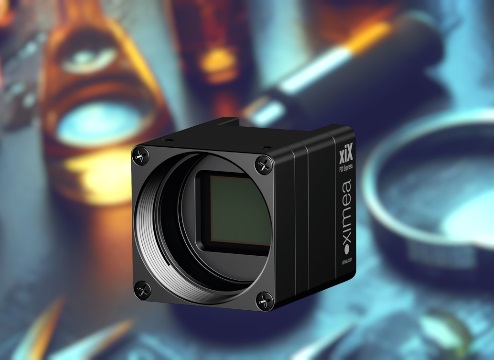Muenster, Germany, April 16, 2024 – As part of its xiLAB initiative, XIMEA expands the offer of Ultraviolet cameras with MX081 models.
Within the realm of modern technology, cameras have progressed from mere devices capturing visible light to sophisticated tools divulging concealed facets of the electromagnetic spectrum.
One of the innovations is the UV camera, delving beyond human visual perception, and unlocking a realm of information that was previously unattainable.
UV cameras operate on the principle of capturing ultraviolet (UV) light, an unseen segment of the electromagnetic spectrum bearing insights into various phenomena, from forensics to astronomy.
UV cameras function by capturing the UV light that objects reflect or emit.
They employ specialized sensors or filters detecting and recording UV wavelengths.
Unlike traditional cameras relying on visible light, UV cameras integrate components designed to prevent contamination from visible and infrared light sources, ensuring that captured images are primarily influenced by UV radiation.
The MX081 model features Sony's IMX487 sensor, renowned for its superior image quality, low noise, and high sensitivity.
The camera delivers exceptional performance and reliability, leveraging Sony's advanced sensor technology, ensuring consistent results in demanding environments.
With a spectral range extending from 200 to 400 nm, XIMEA's MX081 model of UV camera captures UV radiation with exceptional sensitivity and accuracy.
This specific wavelength range allows for the detection of subtle variations in UV reflectance and fluorescence, enabling enhanced analysis and visualization of target materials and substances.
Equipped with a resolution of 8.1 megapixels (2856 x 2848 pixels), the camera delivers sharp, detailed images with precise pixel-level clarity.
With a frame rate of 59 frames per second (FPS), the MX081 camera enables smooth, real-time imaging of dynamic scenes and fast-moving objects.
This high frame rate is ideal for applications requiring rapid image capture, such as machine vision, motion analysis, and quality control in manufacturing processes.
Measuring just 26 x 26 millimeters, it boasts a compact and lightweight design, making it versatile and easy to integrate into a wide range of systems and applications.
Whether mounted on drones for aerial surveys, incorporated into handheld devices for field inspections, or installed in laboratory equipment for scientific research, XIMEA offers flexibility without compromising performance.
The below mentioned extraordinary range of applications, the unmatched features of a UV camera and the broad fascination of scientists to laypeople suggest that the future promises even more evolutionary discoveries in the world of ultraviolet imaging.
UV cameras are beneficial in a widespread field of applications - operating through various wavelenth ranges like UVA (315-400 nm), UVB (280-315 nm), UVC (100-280 nm).





